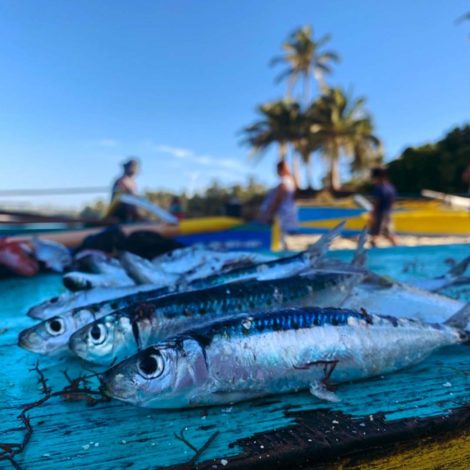
Photo from Oceana
MANILA, Philippines — A marine conservation group recently warned of declining sardine stock in Bicol and Samar waters due to overfishing and called on the government to expedite the implementation of the National Sardine Management Plan.
In a study done by Oceana on the conditions of sardine stocks in Fisheries Management Area 7 (FMA 7) fishing grounds off Bicol and Samar from February 2020 to March 2021, it was revealed that “sardine stocks are overfished.”
The National Sardine Management Plan approved by Agriculture Secretary William Dar on May 15, 2020, aims to improve science-based indicators for the sustainability of fish stocks and distribution of benefits among sardine fisherfolk communities and strengthen science-based management for sustainable sardine fisheries by the end of 2025.
“Many Filipinos depend on sardines not only for food but also for livelihood, making this one of the most important resources in achieving food security in the country. It is therefore imperative that the government safeguards our sardine species that are now on the verge of collapse,” said Atty. Gloria Estenzo Ramos, Vice President of Oceana.
“We strongly urge the implementation of the National Sardines Management Plan in Fisheries Management Areas to stop the dangerous decline of our sardine resource,” she stressed.
Dr. Wilfredo Campos of the University of the Philippines-Visayas, who spearheaded the study, cautioned of dire consequences because of overfishing in the FMA 7 fishing grounds off Bicol and Samar.
“It’s very clear that the sardine stocks are overfished,” he pointed out. “And we should not wait until the limits, the targets are breached. Aside from monitoring, we need to think of measures to arrest further deterioration of the status of the stock.”
“In other words, regardless of who is fishing, the total amount that is being extracted has to be regulated. Lagi tayong humihinto doon (We always stop there). All the science-based measures are fine, but there is not going to be any additional science that can change the situation from over-exploited to good. The science is not going to do that.”
“ The science has already been telling us na bawasan niyo ang (to reduce) fishing, bawasan niyo ang huli (cutback on fishing), bawasan niyo ang nae-extract sa resource (lessen the extraction of resource). Science has been telling us that for a long, long time. That is very, very urgent. All the stakeholders should really sit down, and figure out ano ang acceptable na mga measures (what are the acceptable measures),” Campos added.
The recommendations of Campos would be covered by the implementation of the National Sardine Management Plan.
Based on Oceana’s assessment, the dwindling sardine stock was particularly noted in Balatan, Camarines Sur; Pio Duran, Albay; Monreal, Ticao
It said that heavy fishing pressure, as well as environmental changes over time, contributed to the decreasing sardine resources in the country.
Citing data from the Philippine Statistics Authority, Oceana said that the catch of sardine species bali (tamban) and fimbriati (lawlaw/tuloy) significantly declined from 442,045.75 metric tons in 2010 to 325,226.20 metric tons or 26.4% in 2019.
Oceana said GPS trackers were installed on fishing vessels operating in the FMA 7 and allowed the team to monitor fishing activities in the area over time. This method, the group added, has led the research team to discover that 60% of the total 60,000 metric tons caught in FMA 7 were from Bulan station.
“More than three fourths of the catches in Bulan fall below the size of first maturity. Many juveniles are caught in this area and we need to implement measures to reduce this by regulating the fishing effort – the number of vessels, the frequency of catches, and when they are allowed to operate,” Campos said.
Ramos then said: “As our scientists have said, the time to act on saving our dwindling sardine resource is now. It is crucial that the Management Board of sardine-rich Fisheries Management Area 7 considers the immediate integration and implementation of the National Sardine Management Plan.”
“We need to act swiftly before our sardine resources deteriorate any further and it becomes even more difficult for these sardine species to recover,” she added.
RELATED STORY
Warning up on growing plastic waste amid COVID-19 pandemic